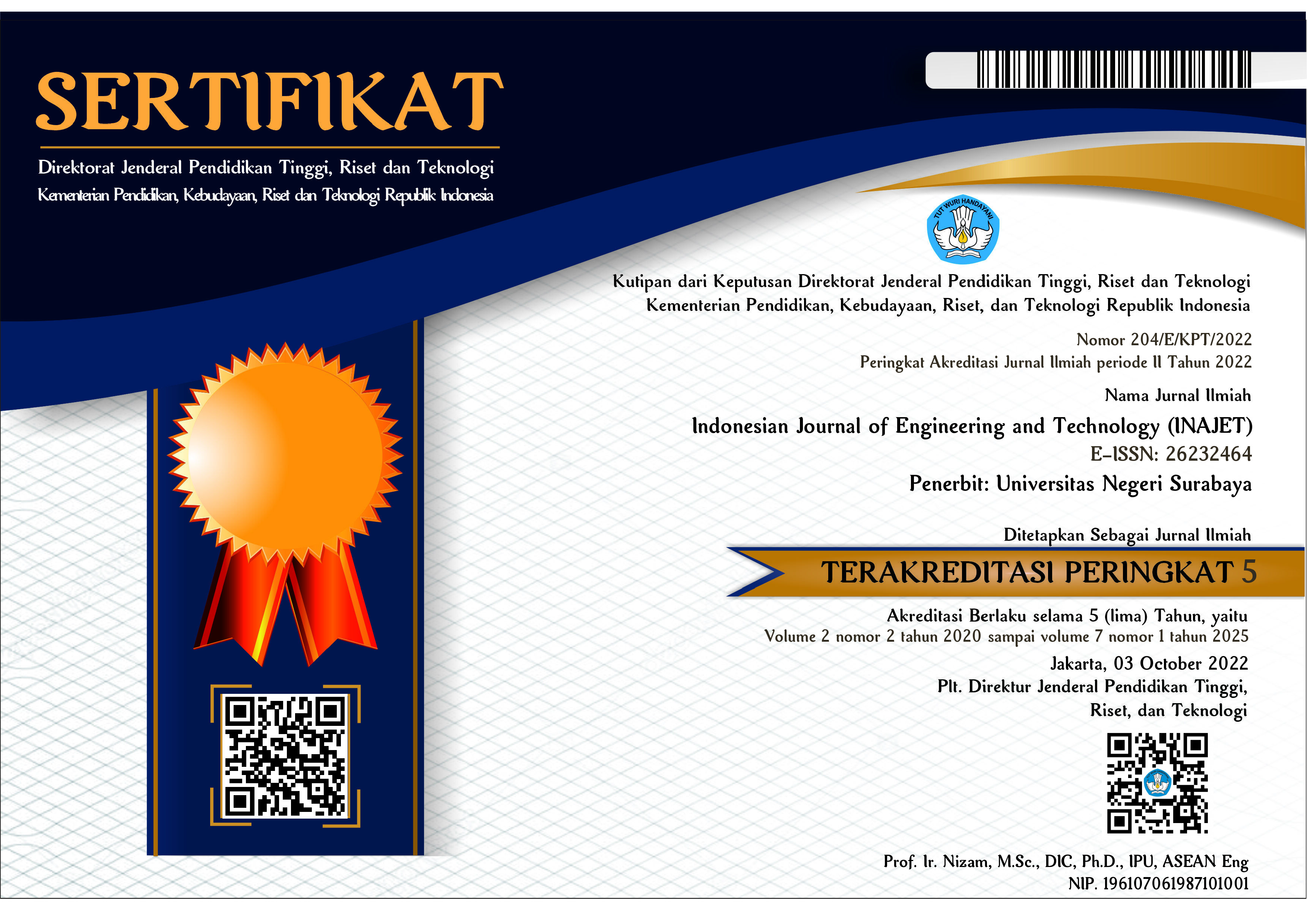About the Journal
Focus and Scope
INAJET is free (open source) all to access and download. The journal includes developments and research in the field in Engineering and Technology, both theoretical studies, experiments, and applications, including:
1. Electrical Engineering
2. Mechanical Engineering
3. Informatic Engineering
4. Industrial Engineering
5. Civil Engineering
Peer Review Process
The author(s) may suggest a list of potential reviewers (title, name, institution, postage address, and email address) maximum 10 reviewers to review their paper. Authors can also propose that someone does not review (maximum 5 researchers) with a reasonable explanation. Reviewers must have the Scopus-ID or Researcher-ID (Thomson Reuters) or recorded as a first author in this journal with (minimum has) a doctoral degree.
Reviewers may also be invited from journals published by major publishers such as Elsevier or Springer. They must come from different institutions with authors; preferably originating from different countries. Reviewers must not be subject to a conflict of interest involving the author(s) or manuscript(s). Nevertheless, the editor is not obligated to use any reviewers suggested by the author(s).
All articles submitted to INAJET will be read and reviewed blindly (double blind peer review) by (minimum) 2 Peer-reviewers who are expert in their field. The Editor may assign the Reviewer(s) from the INAJET's Peer-reviewers, Author(s)' suggestions, other researchers, and/or other INAJET Editorial Member. The acceptance of an article depends on the novelty of research, significance of the article, truth of the content, the degree of originality, the clarity of description, and the conformity with the objective of the journal.
Articles may be accepted without revision, minor revisions, major revision, or rejected. The results of reviewed articles by reviewers will be notified to the author via email. The author is given an opportunity to revise his article based on the reviewers' suggestion (and editor) no later than 8 weeks after the email notification.
All incoming articles will be checked for authenticity to prevent plagiarism by using turnitin and/or iThenticate anti-plagiarism software.
The entire processes from submission until publishing of articles is free of charge (no article processing and submission charges). All articles published on JPFA are open access by following the Creative Commons: Attribution-NonCommercial 4.0 International license. Full license can be found here.
Open Access Policy
This journal provides immediate open access to its content on the principle that making research freely available to the public supports a greater global exchange of knowledge.
Anti-Plagiarism
All articles submitted to INAJET must be the original work (free of plagiarism). The submitted article has never existed in any media and/or is not being or will be submitted in any medias. The author is responsible for the authenticity of the submitted manuscript. All incoming articles will be checked for authenticity to prevent plagiarism by using turnitin and/or iThenticateanti-plagiarism software. Any forms of high-level plagiarism will be banned (temporary up to permanent banned).
Reference Managemet
All articles submitted to Indonesian Journal of Engineering anf Technology (INAJET) should use the reference management software such as Mendeley, EndNote, and Zotero with citation style: Elsevier Vancouver.
Journal History
INAJET or Indonesian Journal of Engineering and Technology, was established by Faculty of Engineering, Universitas Negeri Surabaya in the middle of 2018 to accommodate research conducted by scholars and professionals in the area of Engineering and Technology.











